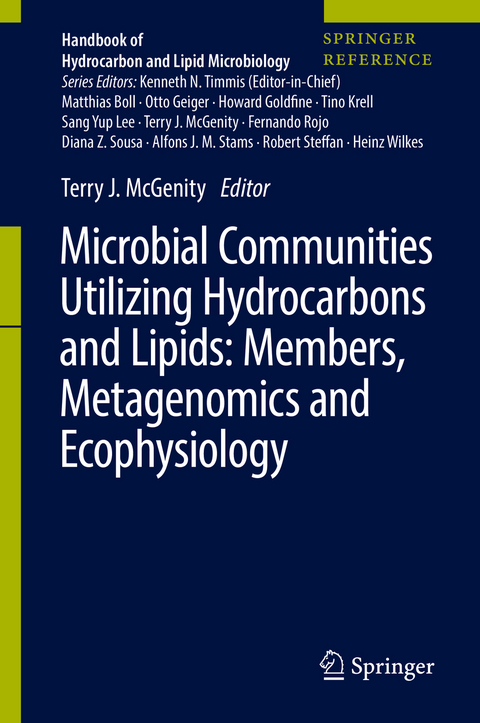
Microbial Communities Utilizing Hydrocarbons and Lipids: Members, Metagenomics and Ecophysiology
Springer International Publishing (Verlag)
978-3-030-14784-6 (ISBN)
Terry McGenity is a Reader at the University of Essex, UK. His PhD, investigating the microbial ecology of ancient salt deposits (University of Leicester), was followed by postdoctoral positions at the Japan Marine Science and Technology Centre (JAMSTEC, Yokosuka) and the Postgraduate Research Institute for Sedimentology (University of Reading). His overarching research interest is to understand how microbial communities function and interact to influence major biogeochemical processes. He worked as a postdoc with Ken Timmis at the University of Essex, where he was inspired to investigate microbial interactions with hydrocarbons at multiple scales, from communities to cells, and as both a source of food and stress. He has broad interests in microbial ecology and diversity, particularly with respect to carbon cycling (especially the second most abundantly produced hydrocarbon in the atmosphere, isoprene), and is driven to better understand how microbes cope with, or flourish in hypersaline, desiccated and poly-extreme environments. He was already section editor at the first edition of this multi-volume Handbook of Hydrocarbon and Lipid Microbiology (2010), and he is co-editor for the 17-volume Hydrocarbon and Lipid Microbiology Protocols 2016.
Microbial Communities Responding to Deep-Sea Hydrocarbon Spills;- Impact of Petroleum Contamination on Microbial Mats;- Phototroph-Heterotroph Oil-Degrading Partnerships;- Microbial Ecology of Marine Environments Chronically Polluted by Petroleum;- Microbial Communities in Hydrocarbon-Polluted Harbors and Marinas;- Hydrocarbon-Degrading Microbial Communities in Natural Oil Seeps;- Anaerobic Methane Oxidizers;- Methanotrophy in Acidic Soils, Including Northern Peatlands;- Microbial Communities in Hydrocarbon-Contaminated Desert Soils;- Surface and Subsurface Coal Environments: From Environmental Formation and Chemistry to Microbial Communities;- Microbial Communities in Oil Shales, Biodegraded and Heavy Oil Reservoirs, and Bitumen Deposits;- Mechanisms and Monitoring of Oil Reservoir Souring Control by Nitrate or Perchlorate Injection ;- Microbial Communities in Oil Sands Tailings: Their Implications in Biogeochemical Processes and Tailings Management;- Microbial Ecology of Naphthenic Acid (NA) Degradation;- Fungal Communities in Hydrocarbon Degradation;-
| Erscheinungsdatum | 14.07.2019 |
|---|---|
| Reihe/Serie | Handbook of Hydrocarbon and Lipid Microbiology |
| Zusatzinfo | XXIII, 352 p. 34 illus., 20 illus. in color. |
| Verlagsort | Cham |
| Sprache | englisch |
| Maße | 155 x 235 mm |
| Gewicht | 720 g |
| Themenwelt | Naturwissenschaften ► Biologie ► Mikrobiologie / Immunologie |
| Schlagworte | biodegradation • crude oil • Deepwater Horizon microorganisms • Ecology • fat biodegradation • grease biodegradation • Hydrocarbon • methanotrophs • Microorganism • Oil-spill microbes |
| ISBN-10 | 3-030-14784-3 / 3030147843 |
| ISBN-13 | 978-3-030-14784-6 / 9783030147846 |
| Zustand | Neuware |
| Haben Sie eine Frage zum Produkt? |
aus dem Bereich


